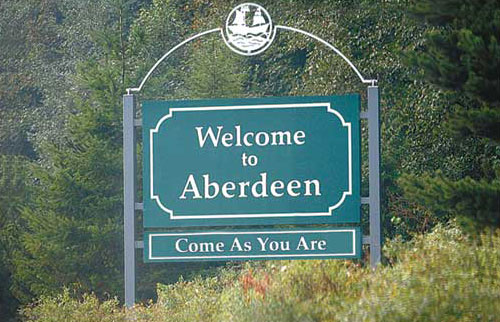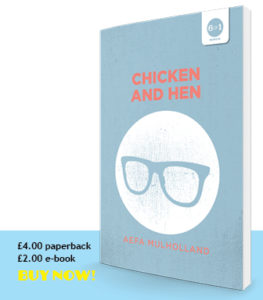 The scenery soon lurches from Bedraggled Small Town to Smoky Industrial. A sign looms on the right, “Welcome to Aberdeen! Come as you are.” I have. I’ve made it. I’m here.
The scenery soon lurches from Bedraggled Small Town to Smoky Industrial. A sign looms on the right, “Welcome to Aberdeen! Come as you are.” I have. I’ve made it. I’m here.
When I first lived in the U.S., I traveled round the country with my brother Mark. People would look up from glowing televisions to ask whether Scotland had electricity. In cities with imposing Carnegie Libraries, we were asked if there were schools in Scotland. As we marked up thousands of miles on the blacktop, we were complimented with some regularity on the excellent English we spoke.
Scot John Logie Baird invented the television in 1925. Industrialist and philanthropist Andrew Carnegie was born in Scotland in 1835. Scot John Loudon MacAdam invented tarmac in the early 1800s. Scot John Dunlop came up with the cunning idea of a pneumatic tyre. The list of Scots’ inventions is a lengthy one. Oh, and Scots have pretty much mastered speaking English. I have hopes that people in Aberdeen will have more awareness of the city and country their home is named after.
Aberdeen’s historic downtown is a sad affair – one of those American towns with its heart slowly dying. Faded turn of the century buildings that must have housed department stores and been all a bustle have sparse window displays or “Lease” signs. I walk down Wishkah Street. Decorative metal surrounds have been placed round skulking, uncertain trees along the sidewalk. In homage to Kurt Cobain, who was born here, one commemorates Nirvana. It’s small and sad. It’s the result of a local group’s petitioning and fundraising. Aberdeen’s Kurt Cobain Memorial Committee is also responsible for a stock of Cobain commemorative items available online, featuring Cobain’s “Come As You Are” lyrics on the town’s welcome sign. I’m torn between a barbecue apron, a “classic thong” or an unintentionally abbreviated badge that states, “ome as you ar.” It could nestle alongside my Washington State snowglobe with the upside down lobster.
Cobain is as big a selling point as they’ve got here. Red Snap Lok letters on a fast food shack’s marquee offer “The New Kurt Cobain Book” in between “Oyster Fritters” and “Clam Chowder.” The troubled singer’s time here earned Aberdeen the title of The Birthplace of Grunge. Grunge sensibly moved to Olympia and then onto Seattle as soon as it saved up the bus fare. I don’t blame it. After a block’s walk through this damp port on the edge of the rainforest I began to suspect that grunge is the direct descendent of drizzle, drabness and depression.
Called Wishkah by its first settlers, Aberdeen wasn’t actually named after the Scottish city of Aberdeen. It turns out that it was named after the adjacent Aberdeen Salmon Cannery, itself named by the “James B. Stewarts”, Scottish immigrants who arrived in 1875. By 1900, things at the mouth of the Wishkah River had got rowdy and Aberdeen was one of the roughest towns on the West Coast, earning it its “Hellhole of the Pacific” accolade. Primarily a mill and fishing town, Aberdeen’s is a hard luck story. It was hit hard by the Great Depression in the 1930’s, then by running out of big trees in the 1950’s and by running out of fish in the 1970’s and 80’s. A brief flirtation with nuclear energy came to nothing. When Spotted Owls inconveniently fluttered onto the Endangered Species list, many forests that provided a livelihood to the town’s population were closed to logging. The sawmill, as well as the nearby Cosmopolis Pulp Mill, closed. Now Aberdeen’s got its hopes pinned on tourism and a new biodiesel plant. I’ve got to admire this pummeled boxer of a town that refuses to admit defeat.
The restaurant I had found mention of online, and arranged to meet Erin in for dinner, turns out to be a dingy “dance bar” by the docks. Wandering the damp streets looking for somewhere more salubrious, I decide to check out another place I’d glanced online, Mac’s Tavern. It’s the only even vaguely Scottish-sounding place in Aberdeen.
The light has all but gone and drizzle falls dolefully. I turn the corner onto West Heron Street and see Mac’s at the other end of the block. Outside, a shadowy figure stands smoking in the shadow of Mac’s neon. There is a rush of noise and a sudden glare of light as the door swings open. A one-legged man on crutches lurches out the door, teeters, and falls flat on his face. The smoking guy stands there, looks at him and takes another drag on his cigarette. I turn. And flee.





Comments are closed.